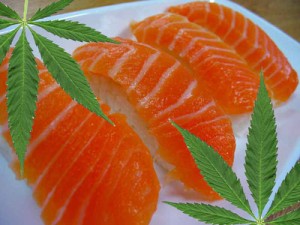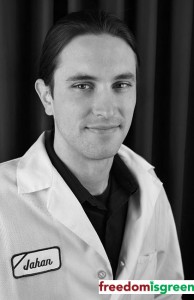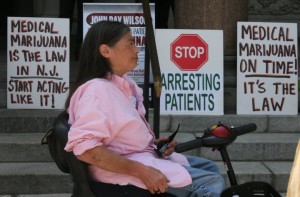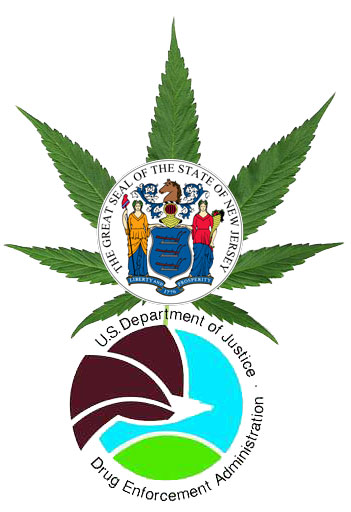 3/28/13 by Chris Goldstein – Scores of people from around the globe have been denied legal entry into the United States because they admitted to smoking marijuana – but not Britain’s Prince Harry.
3/28/13 by Chris Goldstein – Scores of people from around the globe have been denied legal entry into the United States because they admitted to smoking marijuana – but not Britain’s Prince Harry.
New Jersey Governor Chris Christie guaranteed that Harry will remain fully clothed during an upcoming Frankenstorm Tour visit. But before he was topless (and bottomless) in Vegas the red-haired Prince was famous for being the only known stoner in such direct succession to the throne.
In 2002 word got back to Daddy (Prince Charles) that young Harry (16 at the time) was smoking cannabis. Harry was never arrested but the family made him spend one day in a gritty London rehab clinic.
Apparently the Prince of Wales hasn’t had any intimacy with MaryJane since.
But authorities, namely the US Border Patrol, have been notoriously denying entry to the United States to anyone who says they smoked marijuana – and we’re not talking about toking on the day they are trying to cross the border … but EVER.
Sometimes those who are questioned at the border checkpoints are asked if they have used illicit drugs at some point in their lifetime. An honest answer about smoking weed (again: just one single toke at a party) can get you banned from America.
This very questionable practice seems to happen most frequently to citizens of the British Commonwealth: Canadians.
A story from Vancouver BC this week highlights what happens to the serfs:
Elevator mechanic James Sward was interrogated about his drug history during a recent trip to Washington State, and decided to admit the truth: he was busted carrying pot as a teenager, though he was never charged.
But the real trouble came when he confessed he had smoked the drug. Sward’s entry was immediately denied and he found himself banned from the country for life. full article
So how does Harry, the guy with Plantagenet in his blood and cannabis in his past, keep getting past the scrutiny of our borders?
Likely for the same reason that more than 80% of the marijuana arrests in Philadelphia are young black men: Prohibition is not equally enforced.
Laws against pot are used with tremendous discretion especially by authorities at the street level. This is why white women are rarely arrested for weed in Philly and Harry visits when he pleases.
More than seventy years of prohibition has never been an actual deterrent to marijuana use or the underground cannabis market. Instead, these laws have had institutional biases of race and class built into enforcement since the day they were put on the books.
The truth is that recreational consumers smoke cannabis in the pursuit of happiness – exercising a basic and uniquely American civil right.
Until cannabis is completely removed from the federal Controlled Substances Act it will be working-class people of color who will continue to bear the burden of these discriminatory and unjust prohibition laws.
Only when marijuana is fully legalized can we extend the same welcome that Prince Harry enjoys to the rest of the world’s sometime cannabis consumers.
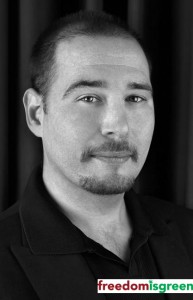 Chris Goldstein is a respected marijuana reform advocate. As a writer and radio broadcaster he has been covering cannabis news for over a decade. Questions? chris(at)freedomisgreen.com
Chris Goldstein is a respected marijuana reform advocate. As a writer and radio broadcaster he has been covering cannabis news for over a decade. Questions? chris(at)freedomisgreen.com

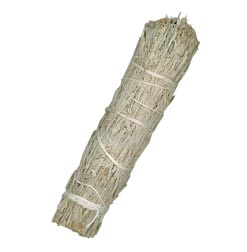


 Jahan Marcu is currently investigating the pharmacology of cannabinoid receptors. He was working at the California Pacific Medical Center Research Institute when exciting discoveries were made showing enhanced anti-cancer effects with THC and CBD from the Cannabis plant. The findings were published in the Journal of Molecular Cancer Therapeutics. In 2009 he received the Billy Martin Award from the International Cannabinoid Research Society (ICRS). Jahan is currently the vice-chair the Medical and Scientific Advisory Board at Americans for Safe Access (ASA). Questions? Contact
Jahan Marcu is currently investigating the pharmacology of cannabinoid receptors. He was working at the California Pacific Medical Center Research Institute when exciting discoveries were made showing enhanced anti-cancer effects with THC and CBD from the Cannabis plant. The findings were published in the Journal of Molecular Cancer Therapeutics. In 2009 he received the Billy Martin Award from the International Cannabinoid Research Society (ICRS). Jahan is currently the vice-chair the Medical and Scientific Advisory Board at Americans for Safe Access (ASA). Questions? Contact 